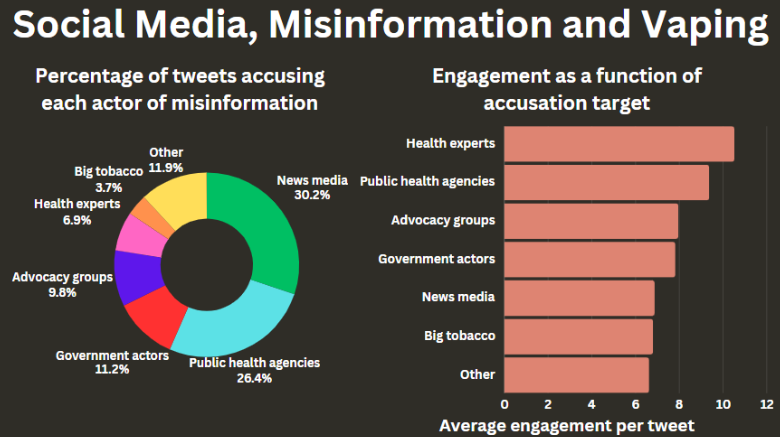Electronic nicotine delivery systems (often referred to as “e-cigarettes”, “vaporizers”, or “vapes”) can be valuable harm reduction tools for people who want to quit smoking cigarettes. At the same time, around half of the youth who vape report that they had never previously smoked cigarettes, and many report becoming dependent on nicotine and experiencing health consequences. Recognizing that vaping can be helpful in some circumstances and harmful in others is an important step towards developing sound public health policies. However, supporters of vaping often accuse people who raise concerns about vaping of misrepresenting the data and being motivated by industry funding. Invalid accusations might confuse people about the true risk/benefit profile of vaping. This week, ASHES reviews a study by Ahmed Al-Rawi and colleagues that examined accusations of vaping-related misinformation on X (formerly known as Twitter).
What were the research question?
(1) Among tweets that accuse people of spreading misinformation about vaping, what are common themes? (2) Which entities are most often accused of pushing misinformation?
What did the researchers do?
Using Twitter’s academic application programing interface1, the research team performed a search for all tweets between August 1st, 2006 and August 12, 2022 that contained the text ‘#vape’ or ‘#vaping’. This resulted in a sample of 6,622,940 tweets. The researchers further searched within this sample for tweets containing any of the following text: ‘fact check*’, ‘misinformation’, ‘disinformation’, ‘fake news’, false news’, ‘fakenews’, and ‘infodemic’. This resulted in a sample of 10,057 tweets. After removing duplicate tweets and non-English language tweets, 2,945 remained. Using this final sample, the researchers then coded the tweets’ stance on vaping, the theme of each tweet, engagement with tweets (defined as likes, replies, retweets) and, if applicable, the specific entity accused of spreading misinformation. Some of the tweets were responses to earlier tweets, but others were unprompted.
What did they find?
Of the 2,653 tweets in this sample, 98.9% maintained provape stances. Most commonly, tweets claimed that vaping is as safe or safer than comparable products (57.0%). Other common topics included calls for policy action (14.6%), the economics of vaping (6.9%), and a broad ‘other’ category (18.4%) that included topics such as COVID-19 and bodily autonomy. The news media (30.2%), public health authorities (26.4%), and government actors (11.2%) were most commonly accused of spreading vaping misinformation. While accusations of spreading misinformation most often targeted news media, accusations against public health experts and public health agencies received the highest engagement per tweet (see Figure).

Figure: (Left) Actors most often accused of spreading misinformation about vaping. (Right) Average engagement (likes, replies, retweets) each accusation received, as a function of accusation target. Click image to enlarge.
Why do these findings matter?
These findings can help guide public health messaging around the potential risks and benefits of vaping. For example, this study showed that news agencies, public health organizations, and health experts are accused of spreading misinformation more than any other sources. Future messaging should incorporate multiple sources of messaging, including “non-expert” sources, such as people who used to vape, to bolster the perceived validity of information. An example of this is the Truth Initiative, who focuses their community outreach efforts on empowering peer leaders to make changes in their own communities.
Every study has limitations. What are the limitations in this study?
This study limited it’s sample to tweets that included the text ‘#vape’ or ‘#vaping’. Though this provided a large initial sample, it is likely that a number of relevant tweets remained missing from the content analysis. Additionally, this study only examined one social media site. Based on the demographics of users between sites, it is likely that different sites would provide different results.
For more information:
Individuals who wish to learn more about the pros and cons of vaping should visit the CDC webpage on vaping. Others who want to quit vaping may benefit from the Truth Initiative. Additional resources can be found at the BASIS Addiction Resources page.
—John Slabczynski
What do you think? Please use the comment link below to provide feedback on this article.
________________
1. Prior to Twitter’s transition to X, the service offered researchers the ability to search through the entire history of tweets on a given topic using the academic application programming interface. This access was revoked after the service’s recent acquisition by Elon Musk.




